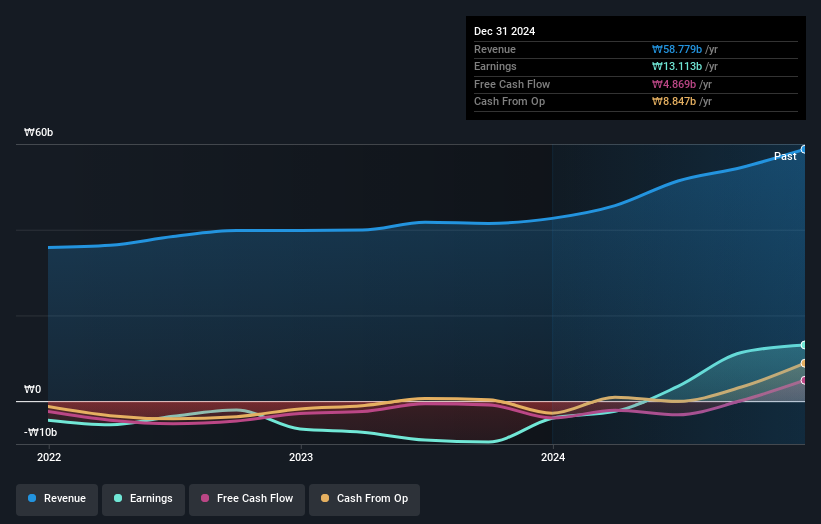- South Korea
- /
- Pharma
- /
- KOSDAQ:A041960
Komipharm International Co., Ltd.'s (KOSDAQ:041960) stock price dropped 10% last week; retail investors would not be happy

Key Insights
- Komipharm International's significant retail investors ownership suggests that the key decisions are influenced by shareholders from the larger public
- 43% of the business is held by the top 17 shareholders
- 40% of Komipharm International is held by insiders
If you want to know who really controls Komipharm International Co., Ltd. (KOSDAQ:041960), then you'll have to look at the makeup of its share registry. With 57% stake, retail investors possess the maximum shares in the company. Put another way, the group faces the maximum upside potential (or downside risk).
While insiders, who own 40% shares weren’t spared from last week’s ₩45b market cap drop, retail investors as a group suffered the maximum losses
In the chart below, we zoom in on the different ownership groups of Komipharm International.
View our latest analysis for Komipharm International

What Does The Institutional Ownership Tell Us About Komipharm International?
Institutions typically measure themselves against a benchmark when reporting to their own investors, so they often become more enthusiastic about a stock once it's included in a major index. We would expect most companies to have some institutions on the register, especially if they are growing.
Less than 5% of Komipharm International is held by institutional investors. This suggests that some funds have the company in their sights, but many have not yet bought shares in it. If the company is growing earnings, that may indicate that it is just beginning to catch the attention of these deep-pocketed investors. When multiple institutional investors want to buy shares, we often see a rising share price. The past revenue trajectory (shown below) can be an indication of future growth, but there are no guarantees.

Komipharm International is not owned by hedge funds. Kyunghoon Yang is currently the company's largest shareholder with 39% of shares outstanding. Meanwhile, the second and third largest shareholders, hold 1.8% and 0.9%, of the shares outstanding, respectively. Furthermore, CEO Seong-Cheol Moon is the owner of 0.5% of the company's shares.
Our studies suggest that the top 17 shareholders collectively control less than half of the company's shares, meaning that the company's shares are widely disseminated and there is no dominant shareholder.
While studying institutional ownership for a company can add value to your research, it is also a good practice to research analyst recommendations to get a deeper understand of a stock's expected performance. We're not picking up on any analyst coverage of the stock at the moment, so the company is unlikely to be widely held.
Insider Ownership Of Komipharm International
The definition of an insider can differ slightly between different countries, but members of the board of directors always count. Company management run the business, but the CEO will answer to the board, even if he or she is a member of it.
Insider ownership is positive when it signals leadership are thinking like the true owners of the company. However, high insider ownership can also give immense power to a small group within the company. This can be negative in some circumstances.
Our information suggests that insiders maintain a significant holding in Komipharm International Co., Ltd.. Insiders have a ₩159b stake in this ₩400b business. It is great to see insiders so invested in the business. It might be worth checking if those insiders have been buying recently.
General Public Ownership
The general public, mostly comprising of individual investors, collectively holds 57% of Komipharm International shares. This level of ownership gives investors from the wider public some power to sway key policy decisions such as board composition, executive compensation, and the dividend payout ratio.
Next Steps:
While it is well worth considering the different groups that own a company, there are other factors that are even more important. To that end, you should be aware of the 1 warning sign we've spotted with Komipharm International .
Of course this may not be the best stock to buy. Therefore, you may wish to see our free collection of interesting prospects boasting favorable financials.
NB: Figures in this article are calculated using data from the last twelve months, which refer to the 12-month period ending on the last date of the month the financial statement is dated. This may not be consistent with full year annual report figures.
Valuation is complex, but we're here to simplify it.
Discover if Komipharm International might be undervalued or overvalued with our detailed analysis, featuring fair value estimates, potential risks, dividends, insider trades, and its financial condition.
Access Free AnalysisHave feedback on this article? Concerned about the content? Get in touch with us directly. Alternatively, email editorial-team (at) simplywallst.com.
This article by Simply Wall St is general in nature. We provide commentary based on historical data and analyst forecasts only using an unbiased methodology and our articles are not intended to be financial advice. It does not constitute a recommendation to buy or sell any stock, and does not take account of your objectives, or your financial situation. We aim to bring you long-term focused analysis driven by fundamental data. Note that our analysis may not factor in the latest price-sensitive company announcements or qualitative material. Simply Wall St has no position in any stocks mentioned.
About KOSDAQ:A041960
Komipharm International
Manufactures and sells veterinary vaccines, veterinary pharmaceuticals and disinfectants, and bio-fertilizers internationally.
Adequate balance sheet with acceptable track record.
Market Insights
Community Narratives




